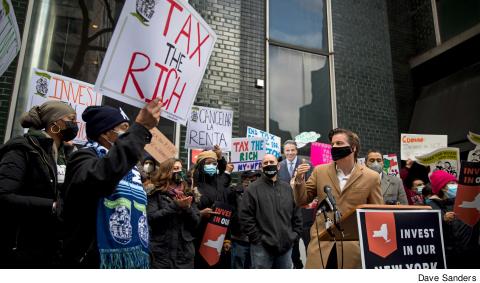Alliance to fund public institutions
 |
As this newspaper went to press, the New York State Legislature and Governor Andrew Cuomo – who is facing impeachment, an investigation by the state attorney general and a chorus of high-level elected officials from Albany to New York City to Washington calling for his resignation – continued state budget negotiations set to conclude by April 1.
The legislature’s proposals offer some good news for CUNY, countering the governor’s original proposal to cut funds for public higher education. The proposals by the New York State Senate and Assembly represent a starting-point in negotiations with the governor over the final budget. PSC leaders have been in conversation with legislators at every stage of developing the bills, urging the legislature to make historic investments in CUNY this year. Both Senate and Assembly bills take major steps toward protecting PSC members and making new investments: they reject the governor’s proposed cuts, provide funding to cover the temporary decline in community college enrollment, add funding for opportunity programs and provide funding to close the “TAP gap,” which the union describes as “the growing difference between [Tuition Assistance Program] funding for students and actual tuition costs.” Both bills also reject the governor’s plan to withhold 5% of state funding from CUNY next year, and call for an end to the “freeze” on raises for state government workers. Both bills also include proposals to increase state revenue by ending tax breaks for the rich.
NEED ANSWERS
But questions remain. Will the final agreement go further to include the new revenue streams New York needs for a lasting recovery? Will legislators seize the opportunity to pass the PSC-backed New Deal for CUNY legislation as a signature achievement? The PSC is a major part of a revenue coalition that is pushing the legislature to pass six new tax bills to claim a fair share of the enormous wealth generated in New York State.
“There’s a large consensus on taxation: the question is how much and which forms of taxation, and not whether to do it,” PSC Legislative Representative Luke Elliott-Negri said of the state lawmakers he and other PSC activists have spoken to. “There seems to be less resistance around a personal income tax,” he said, adding, “The debate is about what income level to start with.”
The governor has been cool to new taxes on the rich but growing calls from state and federal legislators – including New York’s U.S. senators – for him to resign have left him in a weakened bargaining position.
Rebecca Bailin, campaign manager for Invest in Our New York, a coalition pushing for increasing taxes on the rich, said the one-house bills were welcome, but to remember that “now is not the time for half-measures.” Bailin continued, “These budgets will help remedy the challenges our state has faced due to Covid-19, but they lack adequate annual, sustainable revenue for vital services and public goods. Both one-house budgets fail to claim anywhere near the full extent of common-sense, progressive revenue within reach, and therefore do not go far enough in building a New York that stands for all. Without the necessary revenue, the legislature has stopped far short of preventing our public schools from reaching a fiscal cliff when federal aid runs out; ensuring that all New Yorkers have a safe and affordable home; preventing unnecessary overdose deaths; providing safety net equity for excluded workers and so much more.”
Part of the PSC’s organizing around the budget revenue bills has been the creation of the CUNY Caucus, a coalition of legislators committed to a transformation in CUNY funding. The caucus meets on a biweekly basis to discuss how to move the New Deal for CUNY and the “tax the rich” bills forward. In recent weeks, the caucus has met with dozens of state lawmakers from New York’s five boroughs , as well as legislators from Westchester County and Long Island, where many CUNY students, faculty and staff live.
“We want the regionality of our issues to be clear to the leadership and everyone who is paying attention,” said Elliott-Negri.
At the same time, the union is pushing the city, which is responsible for funding CUNY’s community colleges. PSC President Barbara Bowen recently testified at a New York City Council hearing, calling for increased city funding: $77 million to make up for budget cuts over two years, $24 million to offset tuition loss as a result of low enrollment during the pandemic and $20 million to fund the first year of the New Deal for CUNY at community colleges.
CITY LEVEL
“The PSC calls for a fundamentally different approach than the approach you heard from the CUNY administration: we call on you to join us in advocating for a major increase in CUNY funding,” Bowen said. “This is the moment not just to protect CUNY from budget cuts, but to think strategically about the future of the city and invest. The future of CUNY is the future of New York.”

